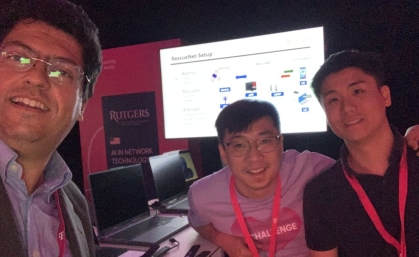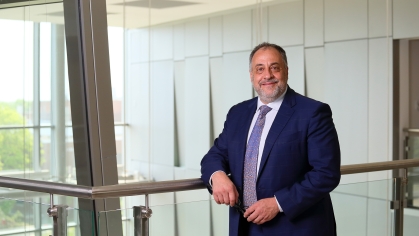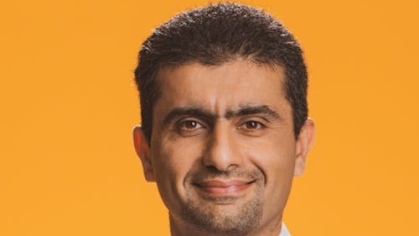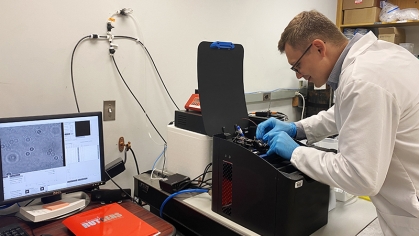ECE Professor is a Top 12 Finalist in the International T Challenge 2025
In early June, Dario Pompili, a professor in the School of Engineering Department of Electrical and Computer Engineering and the director of the Cyber-Physical Systems Laboratory, and two of his team members, doctoral candidates Zhile Li and Songjun Huang, went to Bonn, Germany to compete as one of 12 finalist teams in the 2025 T Challenge.

Sponsored by Deutsche Telekom and T-Mobile US, T Challenge 2025, its theme “AI at the Heart of Telecom – Transforming Networks, Elevating Customer Experiences,” provides a global stage for innovative, pioneering solutions that deploy AI to reshape the future of telecommunications. [
Pompili’s “RescueNet: AI-Driven Radio Access Network for Rapid Disaster Response,” was the only university project among the 450 entrants selected to participate in a live exhibition and stage presentation at Deutsche Telekom’s Bonn headquarters.
Revolutionizing Disaster Response
Working with a team composed of, in addition to Li and Huang, post-doctoral student Ayman Younis, and doctoral candidates Adhwaa Alchaab and Tingcong Jiang, Pompili developed RescueNet, a portable, AI-driven 5G network for rapid deployment in disaster zones and remote areas.
According to Pompili, RescueNet uses Open RAN, or ORAN, architecture and satellite backhaul to ensure reliable, high-speed connectivity for disaster first responders such as police, fire fighters, and medical teams, as well as communities affected by natural disasters, such as hurricanes, wildfires, and earthquakes that often cripple network infrastructures at times they are most needed.
“Its AI engine,” he says, “optimizes spectrum, manages traffic, and enables real-time edge computing, thus providing fast, efficient, and resilient communication in critical situations.”
What excites Pompili most about RescueNet is its use by first responders in unpredictable emergency situations that are increasingly impacting people and communities the world over.
“Our technology can increase coordination among first responders via added communication capabilities in disaster scenarios, besides being able to add connectivity to remote areas,” he says.
A Promising Project
When Pompili co-authored his first paper on RescueNet in 2016, machine learning was not yet capable of solving communications problems in real time. “My lab then resumed that work more recently, when machine learning technology was more mature and able to support RescueNet’s core functionalities.”
After submitting his 2025 T Challenge application last fall and being selected as a finalist, the team was advised by US T-Mobile and D-Telekom mentors as they prepared a comprehensive demo to present in Bonn.
While RescueNet did not place in the final four, competing and presenting in Bonn was productive. Pompili reports that they received positive feedback and suggestions from potential investors, event attendees, and D-Telekom and US T-Mobile managers on additional functionalities to incorporate in RescueNet.
Currently continuing its collaboration with D-Telekom and US T-Mobile, the team is developing a more integrated demo that includes satellite communications and more stable AI-driven functionalities to support the quality of service for a variety of users.
Pompili aims to have a minimum viable product (MVP) available to consumers by summer’s end. “This prototype version of our product should have just enough features to be used by early consumers who will be able to provide feedback for future development,” he explains. “The core idea behind any MVP is to quickly test a product idea with real users to gather feedback and validate whether or not the product is worth pursuing further and avoid building a full-fledged product before understanding market needs.”
While RescueNet technology has already passed the NSF Innovation Corps, or I-CORPS, regional for customer discovery, the plan is to present it to the National I-CORPS in the fall to scale it nationally with more customer interviews.
Looking further ahead, Pompili is equally encouraged by RescueNet’s provisional patent received via Rutgers.


